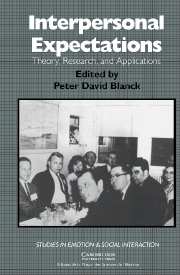Book contents
- Frontmatter
- Contents
- Preface
- List of contributors
- Introduction
- Part I Research on interpersonal expectations
- 3 Introduction to research on interpersonal expectations
- 4 Interpersonal expectations in the courtroom: Studying judges' and juries' behavior
- 5 Expectancies and the perpetuation of racial inequity
- 6 Pygmalion - 25 years after interpersonal expectations in the classroom
- 7 Interpersonal expectations in organizations
- 8 Interpersonal expectations and the maintenance of health
- 9 Precursors of interpersonal expectations: The vocal and physical attractiveness stereotypes
- 10 In search of a social fact: A commentary on the study of interpersonal expectations
- Part II Research on the mediation of interpersonal expectations through nonverbal behavior
- Part III The study of interpersonal expectations
- Author index
- Subject index
- Studies in Emotion and Social Interaction
6 - Pygmalion - 25 years after interpersonal expectations in the classroom
from Part I - Research on interpersonal expectations
Published online by Cambridge University Press: 23 December 2009
- Frontmatter
- Contents
- Preface
- List of contributors
- Introduction
- Part I Research on interpersonal expectations
- 3 Introduction to research on interpersonal expectations
- 4 Interpersonal expectations in the courtroom: Studying judges' and juries' behavior
- 5 Expectancies and the perpetuation of racial inequity
- 6 Pygmalion - 25 years after interpersonal expectations in the classroom
- 7 Interpersonal expectations in organizations
- 8 Interpersonal expectations and the maintenance of health
- 9 Precursors of interpersonal expectations: The vocal and physical attractiveness stereotypes
- 10 In search of a social fact: A commentary on the study of interpersonal expectations
- Part II Research on the mediation of interpersonal expectations through nonverbal behavior
- Part III The study of interpersonal expectations
- Author index
- Subject index
- Studies in Emotion and Social Interaction
Summary
Introduction
Some years ago, the Israeli humorist Ephraim Kishon wrote a successful comedy entitled Ho, Julia, in which he fantasized about the life of the middle-aged Romeo and Juliet, presuming they had survived their dramatic death scene and lived happily ever after. In the same vein, it might be possible to visit Pygmalion and Galatea one generation later, or to analyze the life and work of Robert Rosenthal, the man known among educators and behavioral scientists as “Mr. Pygmalion.” Indeed, Pygmalion in the Classroom also survived deadly criticisms, and the field of teacher expectancies is an important area of educational psychology today. Rosenthal was directly involved in all stages of development of this field throughout the years - introducing self-fulfilling prophecy (SFP) effects to education through Pygmalion; specializing in methodology and meta-analysis during the periods of controversy over the existence of SFP effects; investigating interpersonal interaction processes when the study of behavioral mediation of expectancies gained momentum; and studying nonverbal communication when the study of expectancies moved in that direction. In all of these fields, Rosenthal became a leading expert and a scientific authority.
This chapter is intended to illuminate and discuss central issues in teacher expectancy research and to examine the development of this field since the publication of Pygmalion in the Classroom (Rosenthal & Jacobson, 1968). In the historical analysis (part II), I attempt to trace the underlying psychological reasons for the intense controversies over (teacher) expectancy effects, and to delineate not only the strong trends but also the areas that have remained relatively neglected in teacher expectancy research.
- Type
- Chapter
- Information
- Interpersonal ExpectationsTheory, Research and Applications, pp. 125 - 153Publisher: Cambridge University PressPrint publication year: 1993
- 30
- Cited by



